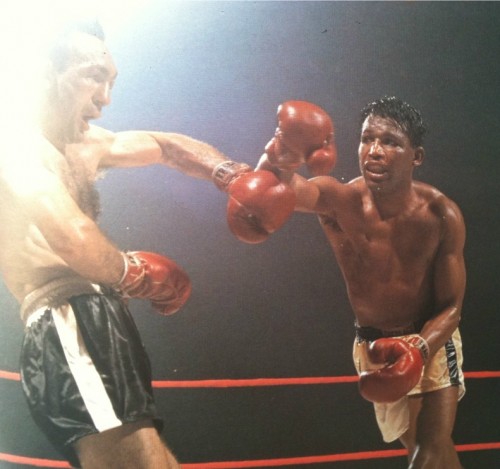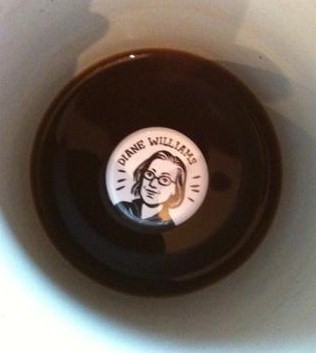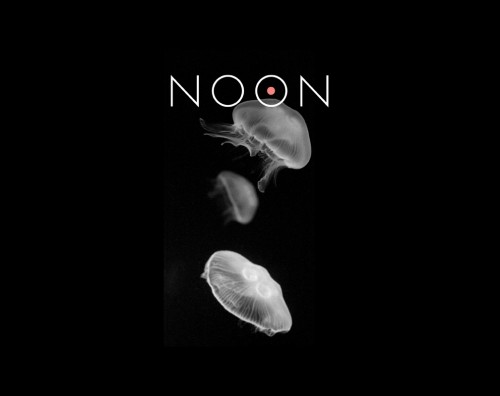NOON Annual 2012: Blunt Reality as Source
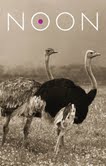 NOON Annual 2012
NOON Annual 2012
Ed. Diane Williams
$12 / Purchase directly from NOON
After reading NOON Annual 2012, I again dwelled on the nature and the value of the short-short story. I despair that short-short works are sometimes disparaged as underdeveloped and unworthy, and this issue of NOON proves the perfect response to such cynicism and dismissals.
First, the design and aesthetics of this literary magazine are first-rate. The book is smooth to the touch, bears weight, and courts the eye. There’s a smell from these pages that, while not pleasant per se, is definite. Definite is not to be underrated. This book is elegant and glamorous. Even the spine is a standout. I pored so long over Bill Hayward’s black and white photograph on page 107, the work bears my countless greasy prints. I love how the subjects here seem afloat, as if there is no ground, as if the whole point is to throw out our assumptions and re-see. Animal portrait photographer Valerie Schaff’s cover is memorable and her self-portrait on the inside cover is stunning and affecting. She writes, “When I am present, I am beyond the notion of predictability.” This quote proved my guide for the reading and the appreciation of the entire issue.
March 9th, 2012 / 1:00 pm
wallop
And the trouble people took to attach a modern-sounding label to these texts and to create a special genre-haven’t there been short texts since way back when? So people were, perhaps they still are, fidgeting with blaster, sudden fiction, flash fiction, prose poem and attempting to segregate these texts. The quality of the thing ought to be foregrounded. -Diane Williams
I believe a reader must work harder in interpreting flash, filling in those gaps with his or her own experiences. -Kim Chinquee
I love the immediacy of the medium–of reading a story that is not only compressed, but memorable in the images that are presented. -Meg Tuite
I had long admired the very short stories of Kafka, Borges, Hempel, others, before I gave the idea of length any real thought. -Pamela Painter.
I’ve been very interested to see what different writers have done with the very short form. It can go in so many directions, and whether one chooses a sort of mini-essay or mini-narrative or prose poem, meditation, etc., each will be quite different because the mind of each different writer comes through so clearly–the writer’s way of thinking, viewing the world, and then of course his or her way of handling language. In such a short form, each word has to be right. -Lydia Davis
I think my stories start fairly short, somewhere in the neighborhood of 200-300 words, and often stay there. -Chella Courington
I’ve always read the shortest stories I could get my hands on. It’s always appealed, the power to receive the full scope of a piece, to tour all the feelings the writer wants you to feel in one uninterrupted moment. It’s so easy to be brutal without consequence to characters in the shortest form. -Amelia Gray
I also think it’s the least egotistical form of writing. Not a lot of show-offs go into writing flash. None that I know anyway. -Mary Hamilton
2 Teach or not 2 Teach
What authors are the most accessible to being taught, especially to young writing students (as in taking their first classes, not age)? What authors are not?
Example. T.C. Boyle. Very teachable. Consistently uses structures easy to graph/visualize, massive layers of basic CW language techniques, always some intent at theme. Now you can argue the merits of his fiction, but that isn’t my point. My point is the merits of the fiction as pedagogically useful.
(You could take this one story and teach a semester of Intro CW: Freytag’s, quest narrative, suspense, immediacy, imaginative prose, precise verbs, unreliable narrator, suspense, POV, etc.)
Diane Williams. Not so great to teach. The voice, the thought, the paroxysms of perfect, and perfectly odd, sentences—you could smother a young writer, you could lead them to a cliff’s edge and accidentally push them off. (Yes, I know Miss Flannery O’Connor, this would do the world a favor, etc.)
Now I generalize, I generalize, so don’t go all sack of hammers. And I’m not saying don’t read any and every writer (OK, not Jewel). And, with upper level classes, I think the ratio switches—Personally, I start bringing in writers I wouldn’t teach earlier (like Diane Williams, Barry Hannah, Gertrude Stein, etc.) and I start removing T.C. Boyle. And I’m not saying you need to take any writing classes, ever—this question is couched in context. OK, enough with the disclaimers. WTF?
I just wonder if you have your own choices: A writer perfect for the teaching of creative writing to young writers, a writer you might want to avoid? I’m sure many of you have had experiences, as student or instructor. What authors glowed, what thunked?
second-hand 7 sawing angels
3. Helen DeWitt on Sam Lipsyte. Great links within (including: I read Sam Lipsyte’s Home Land during one long, heroic bowel movement.)
I am often told by people who meet me after reading my books that they are afraid of me.
7. riverbabble wants your work.
2. Have your character do anything but cry. Thanks.
May 13th, 2010 / 8:48 am
Now Find a Free Mind: A Brief Interview with Diane Williams
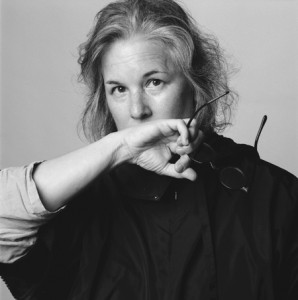 I likely don’t have to give Diane Williams any sort of introduction. Her stories come from the heart–a wax, tender heart, and like a dying engine, ready to blow. Her stories come from the head–savagely recursive, a mirror curved to reflect the heart. Her stories bring me great joy, and it was a delight to interview her; I hope you enjoy this delightfully brief Q&A with Diane Williams: the other voice in your head.
I likely don’t have to give Diane Williams any sort of introduction. Her stories come from the heart–a wax, tender heart, and like a dying engine, ready to blow. Her stories come from the head–savagely recursive, a mirror curved to reflect the heart. Her stories bring me great joy, and it was a delight to interview her; I hope you enjoy this delightfully brief Q&A with Diane Williams: the other voice in your head.
***
AN: One aspect common to both your fiction and some of the fiction you edit seems to be a voice that is both detached and emotional, I think–in fact, your narrators often seem, under the surface, to maintain a very fragile balance between collapse and self-assertiveness. Would you say that’s accurate? If so, what about that voice compels you? From what I can tell, such equanimity requires a great deal of control and grace. How far have you come, since you began writing fiction, in developing that voice?
DW: A very fragile balance between collapse and self-assertiveness — yes, yes, you’re right! How far have I come — since I began writing fiction — in developing that voice? Uh, oh! — perhaps not that far. I wouldn’t be the one to judge. Wouldn’t it be nice if I had come far and had confirmation on that. What compels me toward this voice is that this is apparently my voice — my condition. I’d like to think that the circumstance of the struggle, the perspective on the struggle shifts.
February 1st, 2010 / 12:48 pm
Reup on two Diane Williams interviews, old and new, (1) by John O’Brien at Dalkey Archive, and (2) by Kevin Sampsell at New York Tyrant: “My motive is to break up and reorganize. My prayer is that a new object may be revealed. An object can be seen with clarity and still be mysterious. I love Magritte’s observation that the mind loves mystery because the mind knows that it is mysterious.”
Cover to Cover: NOON, Part 1

Getting excited about the new issue of a magazine or journal is easy enough, but sustaining that interest is a more difficult proposition. Look at your book shelf right now- how many of the “awesome new issue[s] of” whatever it was at the time end up getting abandoned three-quarters, or halfway, or a third of the way through? Today I want to introduce you all to something that I hope will become a regular feature on HTMLGiant. (And not just a feature I write– any of us can do this, and on your own blogs, you can too.) Friends, meet COVER TO COVER, in which I (or YOU) walk the walk of digging your favorite journal by committing to actually read the entire issue from start to finish. For the first COVER TO COVER, I have chosen NOON #9, the tenth anniversary edition of Diane Williams’s and Christine Schutt’s perpetually awesome literary annual. I’ve chosen NOON in part because I just think they’re great (there are few magazines I would rather read from COVER TO COVER) but also because I think that literary annuals are especially dependent on a self-motivated readership, people interested and willing to engage with the publication over a sustained period of time. After all, this will be the “new issue” for twelve full months.
After the jump, I issue my first report on what’s been read so far: Clancy Martin, Kim Chinquee, Brandon Hobson. Also, Augusta Gross’s artwork!
March 27th, 2009 / 3:48 pm
DATELINE, NYC: Diane Williams to offer private fiction workshop through Mercantile Library Center for Fiction

awesome awesome awesome sexy awesome

Some freelancer for Time Out New York thought Diane’s last book was awesome sexy awesome.

